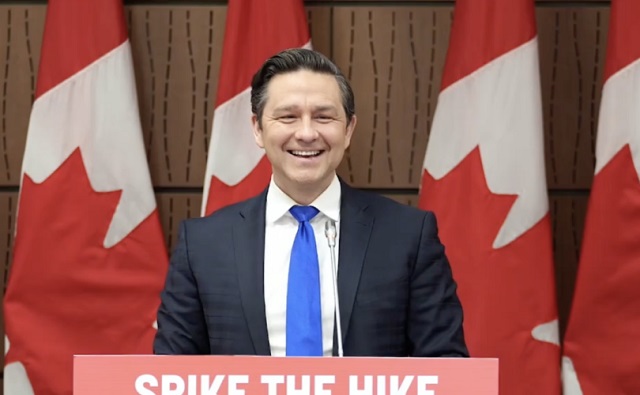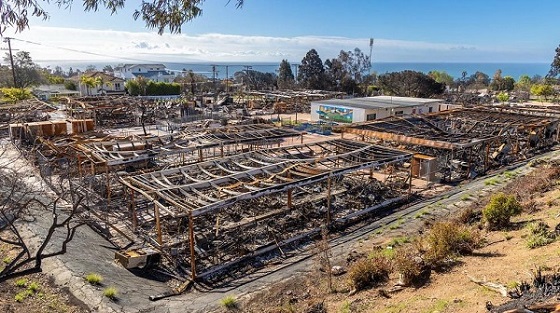Media
CTV News caught splicing misleading clip of Poilievre

From LifeSiteNews
CTV News has since apologized for airing the doctored footage, but claimed it was the result of a ‘misunderstanding’ during the editing process. The Conservatives have since hit back saying they are ‘boycotting’ the outlet until it is admitted the footage was intentionally manipulated.
Canada’s Conservative Party is livid after one of the nation’s largest corporate media outlets, which gets funding from the Trudeau government, was caught splicing a video clip to make it appear party leader Pierre Poilievre said something he did not.
On Monday, Sebastian Skamski, media relations person for Poilievre, took to X to explain that mainstream media news outlet CTV News ran a doctored video clip of the Conservative leader on television misleading viewers, accusing the news outlet of “propagating” the “Trudeau Liberals’ narrative.”
Skamski explained, and proved, that the news outlet had spliced video of Poilievre talking to make it seem as though he was calling for an election because he opposed Prime Minister Justin Trudeau’s dental plan, when the real footage was about the Conservative leader’s opposition to the carbon tax.
“Today @CTVNews was caught splicing a clip of @PierrePoilievre to propagate the Liberals’ narrative. This is not only a total fabrication designed to deceive Canadians but also a major breach of journalistic ethics,” wrote Skamski on X.
Today @CTVNews was caught splicing a clip of @PierrePoilievre to propagate the Liberals’ narrative.
This is not only a total fabrication designed to deceive Canadians but also a major breach of journalistic ethics.
CTV must apologize for their flagrant use of disinformation. pic.twitter.com/vshERYeMih
— Sebastian Skamski (@Skamski) September 23, 2024
Today @CTVNews was caught splicing a clip of @PierrePoilievre to propagate the Liberals’ narrative.
This is not only a total fabrication designed to deceive Canadians but also a major breach of journalistic ethics.
CTV must apologize for their flagrant use of disinformation. pic.twitter.com/vshERYeMih
— Sebastian Skamski (@Skamski) September 23, 2024
“CTV must apologize for their flagrant use of disinformation.”
Skamski then shared a clip of the original video footage, compared to the doctored CTV footage.
“Not only is @PierrePoilievre’s quote clearly about the carbon tax (cut from CTV’s broadcast), @CTVNews bizarrely manipulated it,” he wrote.
The real quote by Poilievre was, “That’s why it’s time to put forward a motion for a carbon tax election.”
The “CTV fabrication,” as Skamski called it, had Poilievre saying, “That’s why we need to put forward a motion,” leaving out his talk of the carbon tax and putting it within the context of the Trudeau government’s dental care plans.
The incident drew immediate backlash from Conservative MPs.
“@CTVNews, you spliced three parts of different sentences together to create a new one that Pierre never said. That’s not a misunderstanding during editing, that’s fabricating disinformation. Where is your apology for that?,” wrote Conservative MP Chris Warkentin on X Monday.
Conservative MP Melissa Lantsman ripped CTV News as untrustworthy and an outlet that “pumps” out “disinformation” to protect Trudeau.
“CTV gets caught pumping disinformation to protect the Prime Minister who subsidizes them,” she wrote on X Monday.
After the backlash, CTV News issued an “apology” for the altered news clip, admitting that the clip was presented in an “out of context” manner, claiming the debacle was the result of a “misunderstanding during the editing process.”
“Last night in a report on this broadcast, we presented a comment by the Official Opposition leader Pierre Poilievre that was taken out of context,” said CTV.
“It left viewers with the impression the Conservative non confidence motion was to defeat the Liberals’ dental care program. In fact, the Conservatives have made it clear the motion is based on a long list of issues with the Liberal government including the carbon tax. A misunderstanding during the editing process resulted in this misrepresentation. We unreservedly apologize to Mr. Poilievre and the Conservative Party of Canada. We regret this report went to air in the manner it did.”
The Conservatives did not buy the apology, however, announcing Tuesday that the party will refuse to engage with CTV News reporters until “they explicitly acknowledge their malicious editing & omission of context to undermine” Poilievre.
Yesterday’s so called “apology” from @CTVNews doesn’t cut it. This wasn’t a simple “misunderstanding”.
Until they explicitly acknowledge their malicious editing & omission of context to undermine @PierrePoilievre, Conservative MPs won’t engage with CTV News & its reporters. pic.twitter.com/6UbfdTo1hg
— Sebastian Skamski (@Skamski) September 24, 2024
Yesterday’s so called “apology” from @CTVNews doesn’t cut it. This wasn’t a simple “misunderstanding”.
Until they explicitly acknowledge their malicious editing & omission of context to undermine @PierrePoilievre, Conservative MPs won’t engage with CTV News & its reporters. pic.twitter.com/6UbfdTo1hg
— Sebastian Skamski (@Skamski) September 24, 2024
The Liberal federal government under Prime Minister Justin Trudeau has pumped billions into propping up the mostly state-funded Canadian Broadcasting Corporation (CBC) as well as large payouts for legacy media outlets including CTV, ahead of the 2025 federal election. In total, the subsidies are expected to cost taxpayers $129 million over the next five years.
Tomorrow, the Conservatives will be voting on a motion of non-confidence in the House of Commons. If successful, it would trigger an election.
The motion is likely to fail, as even though NDP leader Singh pulled his official support for Trudeau’s Liberals two weeks ago, in recent days he has been mum on whether he will vote for or against the Liberals when a vote occurs.
As for the Trudeau Liberals, it is widely accepted that they are floundering, having lost two recent byelections, one in Quebec and the other in Ontario, in what were considered “safe” Liberal ridings.
The most recent loss suggests that Trudeau’s Liberal government is indeed hanging on by a thread, as all recent polls show that Poilievre’s Conservative Party is set to win big when the next federal election takes place.
Censorship Industrial Complex
Canada’s privacy commissioner says he was not consulted on bill to ban dissidents from internet

From LifeSiteNews
Privacy Commissioner Philippe Dufresne that there was no consultation on Bill C-8, which is touted by Liberals as a way to stop ‘unprecedented cyber-threats.’
Canada’s Privacy Commissioner admitted that he was never consulted on a recent bill introduced by the Liberal government of Prime Minister Mark Carney that became law and would grant officials the power to ban anyone deemed a dissident from accessing the internet.
Privacy Commissioner Philippe Dufresne said last week that in regard to Bill C-8, titled “An Act respecting cyber security, amending the Telecommunications Act and making consequential amendments to other Acts,” that there was no consultation.
“We are not consulted on specific pieces of legislation before they are tabled,” he told the House of Commons ethics committee, adding, “I don’t want privacy to be an obstacle to transparency.”
Bill C-8, which is now in its second reading in the House of Commons, was introduced in June by Minister of Public Safety Gary Anandasangaree and has a provision in which the federal government could stop “any specified person” from accessing the internet.
All that would be needed is the OK from Minister of Industry Mélanie Joly for an individual to be denied internet service.
The federal government under Carney claims that the bill is a way to stop “unprecedented cyber-threats.”
The bill, as written, claims that the government would need the power to cut someone off from the internet, as it could be “necessary to do so to secure the Canadian telecommunications system against any threat, including that of interference, manipulation, disruption, or degradation.”
While questioning Dufresne, Conservative MP Michael Barrett raised concerns that no warrant would be needed for agents to go after those officials who want to be banned from the internet or phone service.
“Without meaningful limits, bills like C-8 can hand the government secret, warrantless powers over Canadians’ communications,” he told the committee, adding the bill, as written is a “serious setback for privacy,” as well as a “setback for democracy.”
Barrett asked if the goal of the bill is for Parliament to be granted “sweeping powers of surveillance to the government without a formal review?
Dufresne said, “It’s not a legal obligation under the Privacy Act.”
Experts have warned that Bill C-8 is flawed and must be “fixed.”
The Canadian Civil Liberties Association (CCLA) blasted the bill as troublesome, saying it needs to “fix” the “dangerous flaws” in the bill before it becomes law.
“Experts and civil society have warned that the legislation would confer ministerial powers that could be used to deliberately or inadvertently compromise the security of encryption standards within telecommunications networks that people, governments, and businesses across Canada rely upon, every day,” the CCLA wrote in a recent press release.
Canada’s own intelligence commissioner has warned that the bill, if passed as is, would potentially not be constitutionally justified, as it would allow for warrantless seizure of a person’s sensitive information.
Since taking power in 2015, the Liberal government has brought forth many new bills that, in effect, censor internet content as well as go after people’s ability to speak their minds.
Recently, Canadian Conservative Party MP Leslyn Lewis blasted another new Liberal “hate crime” bill, calling it a “dangerous” piece of legislation that she says will open the door for authorities to possibly prosecute Canadians’ speech deemed “hateful.”
She also criticized it for being silent regarding rising “Christian hate.”
Media
Response to any budget sleight of hand will determine which audience media have decided to serve

The Rewrite
Plus! CBC’s “Intifada Evan” shows the Ombudsman who’s boss and Rebel News puts another tick in the debates win column
Will media go along with the language shell game the government prefers or serve their readers with transparency and the Truth?
The nation’s media and its choice of words will be put to the test when Prime Minister Mark Carney’s government unveils its first budget three weeks from now.
The PM and his Finance Minister, Francois-Philippe Champagne have made it clear that they intend to recategorize capital spending as “investment” and perhaps view their deficit primarily only in terms of any financial shortfall in operational spending. The simplest way to explain the difference between capital and operational is that the former is the money a government would spend to buy or build new ships and aircraft and the latter is what you need every year to keep them afloat, in the air and staffed. If you don’t have enough cashflow to pay the costs of both of those and you have to borrow money to do so, that’s a deficit. Or at least it used to be.
The Rewrite depends on you.
Please consider becoming a free or paid subscriber.
Going forward – and to be fair we won’t know exactly what is coming until we see the budget – it appears Carney and company only intend to speak of the deficit in terms of operational budgets. All other spending, no matter its volume, is likely to be termed capital “investment.” They also appear to be moving subsidies into that category. Hopefully, if this plays out as it appears it will, media will still acknowledge how much the government is borrowing to cover the shortfall between revenue and expenses as at least one prominent analyst anticipates this year’s deficit will hit $100 billion – more than twice the $42 billion forecast by Carney’s predecessor, Justin Trudeau.
The test for media will be to see whether – as so far appears to be the case – they will comply and comfortably go along with the language shell game the government prefers or the language that best serves their readers with transparency and the Truth.
The Parliamentary Budget Officer (PBO) has already raised concerns about the government’s creative accounting proposal.
“Finance Canada’s definition and categories expand the scope of capital investment beyond the current treatment of capital spending in the Public Accounts of Canada,” the PBO stated. “Based on our initial assessment, we find that the scope is overly expansive and exceeds international practice.”
The media’s decisions regarding whose language it uses – its readers’ or its government’s – will tell us a lot about newsroom cultures and priorities.
The CBC’s Evan Dyer is one of those reporters who has refused to take the advice of the Mother Corp’s Ombudsman. Last year, Jack Nagler, now retired, had reviewed complaints about a social media post by Samira Modyeddin concerning the arrest of a Palestinian activist who had threatened to kill Jews and drink their blood.
“This is a healthy reminder for those journalists who feel compelled to weigh in on controversial news stories,” Nagler wrote in his July, 2024 report, before concluding that, “It might be helpful to think about social media the way you would about cutting a piece of wood.
“Measure twice and post once.”
Dyer, who’s too clever by half on X and has been nicknamed “Intifada Evan” by critics, apparently disagrees. In my view, earning noms de plume for bias is not something to which journalists should aspire. Many news organizations agree, which is why they expect their reporters to restrict social media activity to the posting of their own and related work. That way, they aren’t broadcasting their personal biases to the world and damaging public trust in their employer.
Dismissive of Nagler’s advice and oblivious to the fact a Radio-Canada journo, Elisa Serret, had recently been suspended for an antisemitic rant, Dyer had this to say about the news that Bari Weiss had sold her The Free Press to Paramount and been appointed head of CBS News:
“Bari Weiss will be editor-in-chief of CBS News and report directly to David Ellison, son of Larry Ellison, the world’s top private donor to the IDF (Israel Defence Force). Kenneth Weinstein, former CEO of the Hudson Institute, will monitor for “bias” as demanded by FCC commissioner Brendan Carr.”
Or, as some might have read it, “one Jew reports to another Jew, son of a Jew who donates to defend Israel while another Jew monitors the Jews.”
Whether Dyer was told to delete this post or chose on his own to remove it is unknown. But it didn’t disappear fast enough to prevent several critics who took frame grabs that were shared widely and with a powerful blend of enthusiasm and condemnation. The comment of Vivian Bercovici, former Canadian ambassador to Israel, provided a good summary:
“Darn Jooz, eh Evan? They control everything. Banks. Weather. All of it. Qatar? An innocent bystander engaged in good works the world over.”
Sue-Ann Levy added “Hey @EvanDyerCBC … is there a place at CBC HQ where I should pick up my yellow star?”
There was no word at the time of writing whether Dyer had been disciplined but as I write this (he has blocked me) he is still Tweeting away.
In so doing. he has certainly shown that the office of the CBC Ombudsman can be ignored at will and without consequence. Perhaps other of his colleagues will similarly assert themselves.
Readers will recall that Rebel News caused quite a stir at the leaders’ debates during last spring’s federal election – so much so that media were not allowed to ask questions following the English version. That was due to the ruckus that had ensued within the press corps when Rebel staked out the front of the queue after the French debate and asked questions that shocked legacy media, the CBC in particular. The most notorious exchange involved CBC’s Adrienne Arsenault and Rosemary Barton, who accused the Rebel representative of spreading far right misinformation. CBC later issued a correction after Barton stated “yes, there have been remains of Indigenous children found at various places around the country.”
Well, it looks like there’s going to be a sequel. According to Blacklock’s Reporter, the Leaders’ Debate Commission has thrown in the towel when it comes to defining a journalist. As Blacklock’s reported:
“The Debates Commission said it consulted numerous media on methods of accreditation including the Canadian Association of Journalists, CBC, CPAC, Canadian Parliamentary Press Gallery and the Independent Press Gallery that accredits Rebel News. “There was no consensus,” it wrote.
“Nor was there a consensus on what constitutes a media organization, what defines journalism or who is a journalist,” said the report. “Stakeholders noted journalism is not a regulated profession like law or medicine and there is no legal definition of journalism that could be upheld in court.”
Last week I promised to bring forward more on the responses of media that refuse to take government subsidies. Turns out other events took priority and I had columns to write for both The Hub and The Line. I will try to find time to squeeze in an extra column. Readers will also notice a new DONATE button has been added. This allows you to buy The Rewrite a cup of coffee or, if you are feeling generous, a beer, but doesn’t constitute a subscription. Please consider making use of it and help us save journalism from bad journalism. Happy Thanksgiving to you and yours and my thanks to you for your support and encouragement.
(Peter Menzies is a commentator and consultant on media, Macdonald-Laurier Institute Senior Fellow, a past publisher of the Calgary Herald, a former vice chair of the CRTC and a National Newspaper Award winner.)
Subscribe to The Rewrite.
For the full experience, upgrade your subscription.
-

 Business2 days ago
Business2 days agoTruckers see pay surge as ICE sweeps illegal drivers off U.S. highways
-

 International2 days ago
International2 days agoHamas releases all living hostages under Trump peace plan
-

 Business18 hours ago
Business18 hours agoFinance Committee Recommendation To Revoke Charitable Status For Religion Short Sighted And Destructive
-

 Alberta17 hours ago
Alberta17 hours agoOil Sands are the Costco of world energy – dependable and you know exactly where to find it
-

 Brownstone Institute2 days ago
Brownstone Institute2 days agoTrump Covets the Nobel Peace Prize
-

 Health15 hours ago
Health15 hours agoColorado gave over 500 people assisted suicide drugs solely for eating disorders in 2024
-

 Energy18 hours ago
Energy18 hours agoIndigenous Communities Support Pipelines, Why No One Talks About That
-

 Business2 days ago
Business2 days agoNetherlands Seizes Chinese-Owned Chipmaker in Unprecedented Security Move









